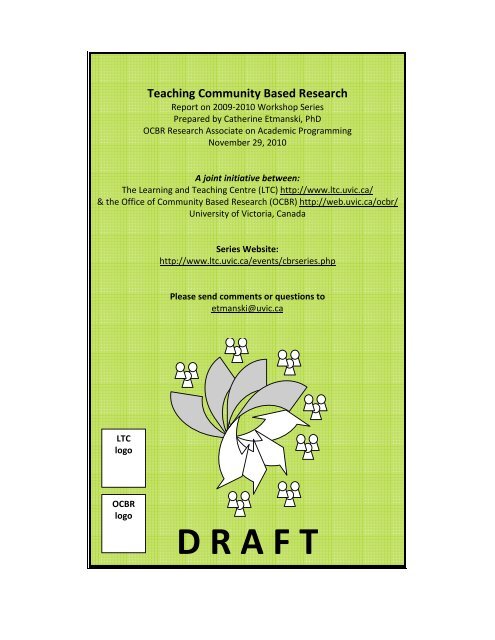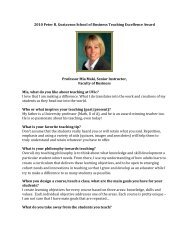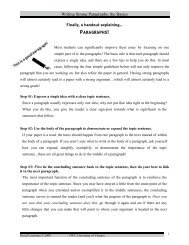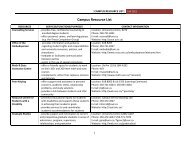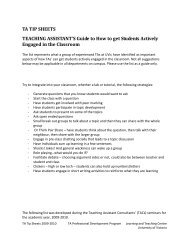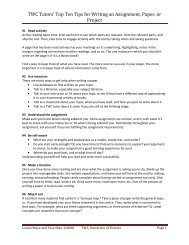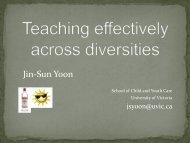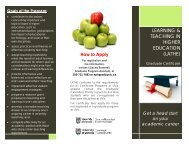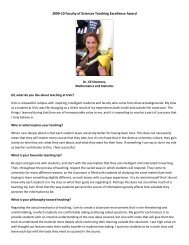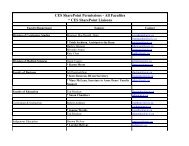C. Etmanski, Teaching CBR 2009-10 Workshop Series Final Report
C. Etmanski, Teaching CBR 2009-10 Workshop Series Final Report
C. Etmanski, Teaching CBR 2009-10 Workshop Series Final Report
- No tags were found...
Create successful ePaper yourself
Turn your PDF publications into a flip-book with our unique Google optimized e-Paper software.
<strong>Teaching</strong> Community Based Research<strong>Report</strong> on <strong>2009</strong>-20<strong>10</strong> <strong>Workshop</strong> <strong>Series</strong>Prepared by Catherine <strong>Etmanski</strong>Table of Contents<strong>Series</strong> Overview................................................................................................................... 3<strong>2009</strong> - 20<strong>10</strong> Organizing Team (in Alphabetical Order) ....................................................... 4Supporters and Resource People.................................................................................... 4Concept and Vision for <strong>2009</strong> - 20<strong>10</strong> <strong>Series</strong>......................................................................... 4Panel Topics and Speakers.................................................................................................. 5Video Documentation......................................................................................................... 6Successes, Challenges, and Recommendations.................................................................. 6Evaluation and Ongoing Engagement................................................................................. 9Appendix A: <strong>Workshop</strong> Descriptions, Dates, and Speaker Bios ....................................... 11First workshop in the series.......................................................................................... 11Second workshop in the series ..................................................................................... 11Third workshop in the series......................................................................................... 12Fourth workshop in the series ...................................................................................... 13Fifth workshop in the series.......................................................................................... 15Sixth workshop in the series ......................................................................................... 16Seventh workshop in the series.................................................................................... 18Appendix B: Contents of Feedback Form ......................................................................... 20Appendix C: Bibliography of Useful References for <strong>CBR</strong> .................................................. 21C. <strong>Etmanski</strong> | <strong>Teaching</strong> <strong>CBR</strong> <strong>Workshop</strong> <strong>Series</strong> <strong>2009</strong>-20<strong>10</strong> | <strong>Final</strong> <strong>Report</strong> 2
<strong>Series</strong> OverviewFrom October 2, <strong>2009</strong> to April 1, 20<strong>10</strong>, UVic’s Learning and <strong>Teaching</strong> Centre (LTC) andOffice of Community Based Research (O<strong>CBR</strong>) ran a series of seven 90-minute lunchtimepanel presentations. The twenty-six presenters included: 18 Faculty members, 3community associates, and 5 students. Between 15 and 40 participants attended eachsession; the most well attended session was on “Indigenous Approaches to Research”followed by the session on “Using the Arts in <strong>CBR</strong>” (see full descriptions in Appendix A).We hosted this series in the Learning and <strong>Teaching</strong> Centre Meeting Room (HHB 128)from 12:30 to 2pm and provided a light lunch at each workshop. Carolyn and Marg atthe LTC organized the lunches, which were funded by both LTC and O<strong>CBR</strong> in alternatingrotation.Dr. Catherine <strong>Etmanski</strong> was the <strong>Series</strong> Coordinator and Facilitator, whose consultingfees were paid for by the O<strong>CBR</strong> in the first year of the series. Catherine is an Instructorin both the Faculty of Education’s Leadership Studies Programme and the School ofPublic Administration’s Master’s of Community Development (MACD) Programme. Sheis also an Educational Consultant in the Greater Victoria Area. Her specialty is facilitatingexperiential and arts-based workshops, and areas of interest include Global Citizenship,Engaged Pedagogy, Ecological Education, and Arts-Based Research. In 2005, she coauthoredan online distance education course called “International Perspectives inParticipatory Research” in collaboration with the Society for Participatory Research inAsia (PRIA), and has been teaching in areas related to Community Based Research sincethen. She currently teaches the core Research Methods course (Foundations of <strong>CBR</strong>) forthe MACD Programme.The Coordinator’s key responsibilities included:• Ongoing liaison between the O<strong>CBR</strong> and LTC;• Contacting and confirming panel presenters;• Drafting workshop descriptions and presenter biographies, to be sent out withthe LTC newsletter and posted on the series website;• Strategic outreach and direct promotions to advertise the series across campus;• Hosting each event, including room set up, tear down, and follow up withspeakers;• Miscellaneous trouble-shooting and responding to queries.C. <strong>Etmanski</strong> | <strong>Teaching</strong> <strong>CBR</strong> <strong>Workshop</strong> <strong>Series</strong> <strong>2009</strong>-20<strong>10</strong> | <strong>Final</strong> <strong>Report</strong> 3
<strong>2009</strong> - 20<strong>10</strong> Organizing Team (in Alphabetical Order)Budd Hall (O<strong>CBR</strong> Director; currently on leave)Carolyn Boss (LTC Programme Coordinator)Catherine <strong>Etmanski</strong> (<strong>Series</strong> Coordinator/Facilitator)Charlotte Charlie (O<strong>CBR</strong> Admin Coordinator)Marg MacQuarrie (LTC Admin Assistant)Teresa Dawson (LTC Director; currently on leave)bhall@uvic.caltc@uvic.caetmanski@uvic.caocbr@uvic.caltcsec@uvic.catdawson@uvic.caKey Supporters and Resource PeopleChristopher Bowers (Story Catcher/Videographer) info@conversationworks.caJohn Lutz (O<strong>CBR</strong> Acting Director 20<strong>10</strong>)jlutz@uvic.caMaeve Lydon (O<strong>CBR</strong> Assoc. Director)mlydon@uvic.caMary Sanseverino (LTC Acting Director 20<strong>10</strong>)msanseve@uvic.caValia Spiliotopoulos (LTC Assoc. Director, on leave in <strong>2009</strong>) vspilio@uvic.caConcept and Vision for <strong>2009</strong> - 20<strong>10</strong> <strong>Series</strong>As part of its 2007 Strategic Plan, UVic has articulated a goal to “establish UVic as arecognized cornerstone of the community, committed to the sustainable social, culturaland economic development of our region and nation” (p. 13,http://web.uvic.ca/strategicplan/pdf/strategicplan.pdf).To support UVic in achieving this goal, the O<strong>CBR</strong> has a mandate to “facilitatecollaborative community-university research and partnerships that enhance the qualityof life and the economic, environmental and social well-being of communities”(http://web.uvic.ca/ocbr/mission.html). To achieve this mandate, the O<strong>CBR</strong> conducts arange of activities, including, “educational and capacity building opportunities includingseminars, colloquia, talks, workshops and courses”.Similarly, the Learning and <strong>Teaching</strong> Centre (LTC) supports UVic in achieving its goal ofinspired teaching: “We aim to be set apart by the quality of our teaching. As acomprehensive research university, our faculty bring their innovative research into anengaging classroom setting that encourages creative problem solving and originalthought” (http://www.ltc.uvic.ca/about/uvic-teaching-mission.php).In <strong>2009</strong>, Lisa Helps (on behalf of the O<strong>CBR</strong>) conducted research with Faculty membersacross campus. The concept for this series was generated, in part, by the needsexpressed in and emerging from this research, as well as the by complimentaryC. <strong>Etmanski</strong> | <strong>Teaching</strong> <strong>CBR</strong> <strong>Workshop</strong> <strong>Series</strong> <strong>2009</strong>-20<strong>10</strong> | <strong>Final</strong> <strong>Report</strong> 4
mandates of the LTC and O<strong>CBR</strong> and the two offices’ desire to work in collaboration. (Formore information on this report, please contact Maeve Lydon at mlydon@uvic.ca.)The Promises and Perils of <strong>Teaching</strong> Community-Based Research (<strong>CBR</strong>):A <strong>Workshop</strong> <strong>Series</strong>Are you teaching or would you like to include teaching of community-based research(<strong>CBR</strong>), participatory research (PR), community or participatory action research (CAR orPAR), Indigenous research approaches, engaged scholarship, or other members of thismethodological family in your courses?Through a series of lunchtime conversations, the Learning and <strong>Teaching</strong> Centre (LTC)and Office of Community-Based Research (O<strong>CBR</strong>) have joined forces to provide a spaceto support all of you who are engaged in this kind of leading edge teaching, learning,and research at the University of Victoria.Panel Topics and Speakers1. The Ever Expanding World of Community Based Research: Where Are We GoingNow? (With Jo-Anne Lee, Bernie Pauly, Leslie Brown, and Budd Hall)2. Indigenous Research Approaches: Opening New Pathways to CommunityRegeneration (With Jeff Corntassel, Robina Thomas, and Christine O'Bonsawin)3. Making Community-University Partnerships Work (With Lorna Williams, John Lutz,Tricia Roche, and Jane Worton)4. From Research to Action: The Impact of <strong>CBR</strong> (With Anne Marshall, Abebe Teklu, andJessica Ball)5. Using the Arts in <strong>CBR</strong> (With Catherine <strong>Etmanski</strong>, Sheila Simpkins, Nishad Khanna, LizMerkel, and Tieja Thomas)6. Assessing Excellence and Valuing the Diverse Academic Contributions of Indigenousand Community-Based Scholars (With Onowa McIvor, Teresa Dawson, and KathySanford)7. Multi-disciplinary Research Internship Courses: Background and Practices at UVic(With Margo Matwychuk, Chris Leischner, Agata Stypka, and Joaquin Trapero)Most of the speakers’ contact information can be found through the UVic database:https://www.uvic.ca/resources/searchdir/people.phpC. <strong>Etmanski</strong> | <strong>Teaching</strong> <strong>CBR</strong> <strong>Workshop</strong> <strong>Series</strong> <strong>2009</strong>-20<strong>10</strong> | <strong>Final</strong> <strong>Report</strong> 5
Video DocumentationA local “Story-Catcher” (Christopher Bowers of conversationsworks.ca) was hired tovideo-record several of the panel presentations. He also interviewed some of thespeakers individually.Readers can find the main menu of O<strong>CBR</strong> video clips on blip.tv here:https://www.uvic.ca/resources/searchdir/people.phpSpeakers from the series are featured here:Abebe Teklu (Part 1) http://ocbrinstitute.blip.tv/file/3285905/Abebe Teklu (Part 2) http://ocbrinstitute.blip.tv/file/3285873/Catherine <strong>Etmanski</strong> http://ocbrinstitute.blip.tv/file/3305262/Darlene Cloverhttp://ocbrinstitute.blip.tv/file/3155901/John Lutzhttp://ocbrinstitute.blip.tv/file/3<strong>10</strong>7485/Kathy Sanfordhttp://blip.tv/file/3522988/Leslie Brown (Part 1) http://ocbrinstitute.blip.tv/file/3348258/Leslie Brown (Part 2) http://ocbrinstitute.blip.tv/file/3348249/Lorna Williamshttp://ocbrinstitute.blip.tv/file/2269917/Margo Matwychuck http://ocbrinstitute.blip.tv/file/3128299/Onowa McIvorhttp://ocbrinstitute.blip.tv/file/3523094/Teresa Dawsonhttp://blip.tv/file/3523114Panel presenters and audience members alike responded to the video documentationwith varying degrees of receptivity: some were very enthusiastic to speak about theirwork; others expressed some discomfort in being taped.While it certainly is helpful to have these talks documented, in general, the act of videorecording created an additional layer of complexity for the series, and raised someethical concerns around ensuring informed consent. Recommendation: If storycatchingwill be used during future workshops and events, I recommend that morethought be put into permission-seeking, the intended use of video materials, andensuring participants’ general comfort with the format in advance (e.g. include noticethat it will be video-recorded in the promotional materials).Successes, Challenges, and RecommendationsIt is important to be clear that the verbal feedback we have received on this series todate has been positive overall. Staff members at the Learning and <strong>Teaching</strong> Centre haverepeatedly mentioned that these workshops are some of their most popular events, anda number of participants attended regularly. The 20<strong>10</strong> to 2011 “Engaging Scholars”series is already underway, with an increased emphasis on Community-EngagedC. <strong>Etmanski</strong> | <strong>Teaching</strong> <strong>CBR</strong> <strong>Workshop</strong> <strong>Series</strong> <strong>2009</strong>-20<strong>10</strong> | <strong>Final</strong> <strong>Report</strong> 6
Research (CER) and intentional outreach in non-traditional <strong>CBR</strong> Faculties such asBusiness and Engineering. See the series website for updates on this year’s speakers:http://www.ltc.uvic.ca/events/cbrseries.phpThe momentum and cross-campus interest in this series has resulted in a proposed bookon Learning and <strong>Teaching</strong> Community Based Research (C. <strong>Etmanski</strong>, T. Dawson & B. Hall,Eds.). The original proposal contains 18 chapters from 30 UVic and local Victoria(community-based) researchers and is currently under review by the University ofToronto Press.The series was successful in three key areas:1. In establishing a solid working relationship between the LTC and O<strong>CBR</strong>;2. In generating awareness of and further interest in the role of both the LTC andO<strong>CBR</strong> ina. promoting innovative teaching strategies (such as those employed by<strong>CBR</strong> practitioners), andb. supporting and promoting <strong>CBR</strong> on campus; and finally3. In highlighting the community-based work of 26 scholars and communityresearchers in the Victoria area, thereby raising the profile of <strong>CBR</strong> at UVic.The following section includes several areas that presented unanticipated challenges.These comments are not intended to undermine the above-described success; rather,they are meant to offer a thoughtful reflection on our practice and recommendations aswe move forward.1. Consistency of Purpose: As is often the case, the speakers did not always know eachother in advance and were often not able to communicate prior to the session. Attimes, a few of the speakers also did not address the key question or proposed topic.While all the comments were undoubtedly interesting, as a facilitator, I would like tosee more clarity of purpose amongst panel presenters. Recommendation: Invitepanelists who already have a working relationship and can give differentperspectives on one research topic or project (e.g. the 2 nd workshop on IndigenousResearch and 7 th workshop on Multi-Disciplinary Research Internships—see fulldescriptions in Appendix A below).2. Repetition and Pre-Requisite Knowledge: While some participants attended almostevery workshop, for the most part, the audience was different at each one, as werethe panelists. This is to be expected in a drop-in model; however, for this reason,there was usually some overlap between both speakers’ comments and audiencequestions. For example, audience members would regularly ask questions along thelines of, “What does the word community really mean?” or “Aren’t Universities partof communities?” While these are important questions and related to the patienteffort of building knowledge around the practice of <strong>CBR</strong>, they were indicative of thevarious levels of exposure to <strong>CBR</strong> in the room. As an educator, at times I would haveC. <strong>Etmanski</strong> | <strong>Teaching</strong> <strong>CBR</strong> <strong>Workshop</strong> <strong>Series</strong> <strong>2009</strong>-20<strong>10</strong> | <strong>Final</strong> <strong>Report</strong> 7
Evaluation and Ongoing EngagementWe made a number of efforts to evaluate the series and promote ongoing engagement,namely: several iterations of a feedback/evaluation form, the creation of a Moodle Site,and a proposed focus group to evaluate the series. While these efforts were good ideasin principle, in practice, they were not the best use of energy for the following reasons:• In spite of ongoing encouragement to fill out the feedback forms (includingcreating a shortened version of the form, and explicitly passing out the form atthe beginning of each workshop) only 14 individuals filled them out for themajority of the workshops. Verbal feedback was very positive, but it seemspeople did not see the intrinsic value in providing written feedback. There wasone exception: the session on “Using the Arts in <strong>CBR</strong>” elicited 19 feedback sheetsalone (for a total of 33 forms for the whole series). I am not certain why thisworkshop elicited more responses, but I suspect it has something to do with thearts-based content, which elicited a different quality of engagement in general. Recommendation: While evaluation is, of course, an important component ofany outreach and educational effort, more thought is needed on creativestrategies for eliciting both formative and summative feedback, the intentionbehind the feedback forms, what could be done with the information collected,and the real time and effort required to undertake a thorough and usefulevaluation.• The feedback we did receive was either so pleasantly positive as to not behelpful (e.g. “thank you, I enjoyed the presentation”) or the dissatisfactionexpressed was preference-based, not particularly constructive, or sometimes notrelated to the overall mandate of the series (e.g. “we need tables to write on”when tables are intentionally moved to the side to create more space in theroom; or “can you include the time in the e-mail notices?” when the time wasalways included; or “invite members from the community, whether it is youth,ethnic minorities, etc.” when outreach beyond campus was not the purpose ofthis particular series, but is key to O<strong>CBR</strong> practices elsewhere).• One interesting comment, (which was addressed during the IndigenousApproaches to Research panel, but not as part of every panel) was:o “I would like a discussion of ‘colonialism’ in the academy – is <strong>CBR</strong> a shieldfor a new form of colonialism?” (See section on critical questions abovefor more thoughts on continuity between workshops.)• Because this was not designed as a regular UVic course format, setting up aMoodle Site required several face-to-face meetings and much back and forth e-mail correspondence with UVic’s IT help services. Once we finally managed to setit up, unfortunately it was not spontaneously used for ongoing conversationsC. <strong>Etmanski</strong> | <strong>Teaching</strong> <strong>CBR</strong> <strong>Workshop</strong> <strong>Series</strong> <strong>2009</strong>-20<strong>10</strong> | <strong>Final</strong> <strong>Report</strong> 9
While there are as many indigenous approaches to research as there are indigenousresearchers, the Learning and <strong>Teaching</strong> Centre, in collaboration with the Office ofCommunity Based Research, invite you to join a conversation with three Indigenous,UVic-based scholars on current trends, challenges and successes in IndigenousApproaches to research:Dr. Christine O'Bonsawin, Abenaki, Odanak Nation, is the Director of the IndigenousStudies Minor Program and Assistant Professor in the Department of History. Herprimary research areas include Indigenous sport history, Olympic history, andIndigenous and sport policy. Her recent publications focus on Olympic racialisingideologies and the appropriation of Indigenous cultures and symbolism.Robina Thomas, Lyackson, Coast Salish Nation, is an Associate Professor in the School ofSocial Work. She holds a BSW, MSW, and is working towards a PhD in IndigenousGovernance. Robina is committed to First Nations education and her research interestsinclude Storytelling, Residential Schools and Uy'skwuluwun: On Being Indigenous. She iscommitted to understanding anti-racism and anti-oppression and how these can belived.Dr. Jeff Corntassel, Cherokee Nation, is an Associate Professor and Graduate Advisor inthe Indigenous Governance Programme. His research interests include notions ofsustainable self-determination, practicing insurgent education, and a comparativecritique of state apologies/truth and reconciliation efforts as they impact Indigenousnations in Canada, Australia, Guatemala and Peru.Experienced practitioners and interested newcomers are welcome.Third workshop in the seriesMaking Community-University Partnerships Work [<strong>Teaching</strong> Community-Based Research<strong>Workshop</strong> <strong>Series</strong>]Friday, December 4, <strong>2009</strong> [Light lunch provided]12:30 PM ~ 2:00 PM , HHB 128A conversation with Tricia Roche, TAPS' Coordinator; Jane Worton, Community Counciland Queenswood Consulting; Lorna Williams, Canada Research Chair in IndigenousKnowledge and Learning; John Lutz, Department of History.This workshop will explore diverse examples and questions related to communityuniversitypartnerships, including but not limited to: How to ensure all members of thepartnership feel respected and heard; how to mobilize resources from both institutions,C. <strong>Etmanski</strong> | <strong>Teaching</strong> <strong>CBR</strong> <strong>Workshop</strong> <strong>Series</strong> <strong>2009</strong>-20<strong>10</strong> | <strong>Final</strong> <strong>Report</strong> 12
and make best use of the unique skills of all members; and what are the ethics andresponsibilities involved in community-university partnerships?Tricia Roche, TAPS' Coordinator, has a Masters degree in Human Rights fromMcGillUniversity and over twenty years experience working in the non-profit sector, includingeight as Associate Manager of Outreach Services of the YM-YWCA of Greater Victoria.She currently works with the Office of Community Based Research at the University ofVictoria on the UVic/Community Housing and Homelessness Strategy and hasexperience working in West Africa and Central America.Jane Worton currently works with the Queenswood Consulting Group and is the pastResearch Director for the Community Council. She completed her Master's degree in theUVic Studies in Policy and Practice program earlier this year. Her research projectentitled, "Poor people's participation in poverty reduction," explored the contextspecificfactors that supported and constrained the participation of nineteen peopleliving on low income in poverty reduction initiatives.Dr. Lorna Williams is Lil'wat from the St'at'yem'c First Nation. She holds the CanadaResearch Chair in Indigenous Knowledge and Learning at UVic, and also the Director ofAboriginal Teacher Education. Lorna is the previous Director of the Aboriginal EducationEnhancement Branch at the Ministry of Education, and served as a First NationsEducation Specialist with the Vancouver School Board. She has co-directed videos,written children's books, teachers' guides, and Lil'wat language curriculum.Dr. John Lutz joined the faculty at the UVic in 1997. Since then, he has developed somecommunity based research projects, particularly through the Coasts Under Stressproject where he worked in the First Nations communities of Hartley Bay and Alert Bay.He also co-teaches an Ethnohistory Field School Course every other year with the Stó:loFirst Nation. He serves as co-director of the Great Unsolved Mysteries in CanadianHistory Project and director or partner in several history-oriented website projects.Experienced practitioners and interested newcomers are welcome.Fourth workshop in the seriesFrom Research to Action: The Impact of <strong>CBR</strong> [<strong>Teaching</strong> Community-Based Research<strong>Workshop</strong> <strong>Series</strong>]Thursday, January 7, 20<strong>10</strong> [Light lunch provided]12:30 PM ~ 2:00 PM, HHB 128A lunchtime conversation with Dr. Anne Marshall, Department of EducationalPsychology & Leadership Studies (EPLS); Dr. Abebe Teklu, Department of EducationalPsychology & Leadership Studies; and Dr. Jessica Ball, School of Child and Youth Care.C. <strong>Etmanski</strong> | <strong>Teaching</strong> <strong>CBR</strong> <strong>Workshop</strong> <strong>Series</strong> <strong>2009</strong>-20<strong>10</strong> | <strong>Final</strong> <strong>Report</strong> 13
Fifth workshop in the seriesUsing the Arts in <strong>CBR</strong> [<strong>Teaching</strong> Community-Based Research <strong>Workshop</strong> <strong>Series</strong>]Friday, February 5, 20<strong>10</strong> [Light lunch provided]12:30 PM ~ 2:00 PM, HHB 128A conversation with Dr. Darlene Clover and Dr. Catherine <strong>Etmanski</strong>, Department ofEducational Psychology & Leadership Studies, and Faculty of Education grad studentsSheila Simpkins, Nishad Khanna, Liz Merkel, and Tieja Thomas. [DARLENE CLOVER HADTO CANCEL DUE TO ILLNESS]This workshop will explore how the arts can be and are currently being applied in thecontext of <strong>CBR</strong>. The speakers will discuss:• definitions and history of Arts Based Research,• the role of symbolic language,• how to elicit data through arts-based methods, and• questions around validity and art as representation.The workshop will also demonstrate one arts-based method: Métissage, with anintroduction to this story-telling/story-weaving method and a performance by four gradstudents.Darlene Clover is an Assistant Professor in the Faculty of Education, Leadership Studies.She was recently the primary investigator on an international comparative researchstudy on Women’s Community Arts and Crafts in Canada and New Zealand. Through thisproject, she connected with dozens of grassroots artists and activists around the worldwho were using the arts as catalysts for Learning, Defiance, and Social Change. Moreinformation can be found here: http://www.educ.uvic.ca/communityarts/index.htmlCatherine <strong>Etmanski</strong> is a Sessional Instructor in the Department of Leadership Studiesand an Educational Consultant in the Greater Victoria Area. Her specialty is facilitatingPopular Theatre workshops, and her areas of interest include Arts-Based Research,Global Citizenship, and Ecological Education. For her doctoral research, she worked withinternational graduate students to create a popular theatre performance, which made acreative contribution to discussions around the Internationalization of campus and thechallenges facing students, staff, faculty, and members of the community.Sheila Simpkins is a doctoral student in the department of Curriculum and Instruction.For her research, she is exploring how the tool of Métissage can be used as a peaceeducation initiative to foster understanding of and empathy for the Other, and topromote dialogue around peace between Kurdish and Arab students in Kurdistan,Northern Iraq. Before returning to her graduate studies, she taught academic Englishwriting to university students in China, Turkey, and Northern Iraq.Nishad Khanna is currently working on his M.A. in Curriculum and Instruction. He is alsothe research coordinator of the Centre of Excellence for Youth Engagement, led by theC. <strong>Etmanski</strong> | <strong>Teaching</strong> <strong>CBR</strong> <strong>Workshop</strong> <strong>Series</strong> <strong>2009</strong>-20<strong>10</strong> | <strong>Final</strong> <strong>Report</strong> 15
Students Commission of Canada, a national youth organization. Nish is interested inmeaningfully engaging young people in research to reveal critical knowledge that isoften silenced, devalued or omitted in typical research processes. His thesis researchexplores the practice(s) of anti-racist, feminist, intergenerational participatory actionresearch based upon a project undertaken in partnership with Antidote: Multiracial andIndigenous Girls and Women’s Network.Liz Merkel is a Masters student in Curriculum and Instruction, a seminar instructor andsupervisor for students in the teacher education program. Her passion for teaching atthe primary school age led her to undertake Masters research wherein she studies howautoethnography in teacher education programs critically impacts pre-service teacherpractice. She also works on a research project with Dr.Kathy Sanford related to learningand video game play, as well as a project with Dr. Catherine McGregor related toalternative practicum experience in teacher education programs.Tieja Thomas is an M.A. student in the department of Educational Psychology &Leadership Studies. Her current research explores the educational beliefs held byleaders working within the domain of non-formal education. Prior to beginning herstudies at UVic, she coordinated non-formal educational programs within various nonprofitorganizations located in Montreal, QC. In addition to her M.A. work, Tieja is aResearch Assistant for the Beyond the Classroom Walls study, a project that examinesthe effects of pre-service teacher educators’ participation in alternative practicumexperiences.Sixth workshop in the seriesAssessing Excellence and Valuing the Diverse Academic Contributions of Indigenous andCommunity-Based Scholars [<strong>Teaching</strong> Community-Based Research <strong>Workshop</strong> <strong>Series</strong>]Thursday, April 1, 20<strong>10</strong> [Light lunch provided]12:30 PM ~ 2:00 PM, HHB 128A conversation with Robina Thomas, School of Social Work; Onowa McIvor, IndigenousEducation; Kathy Sanford, Teacher Education; and Teresa Dawson, Department ofGeography and the Learning and <strong>Teaching</strong> Centre.Indigenous and other Community-Based approaches to research and teaching regularlychallenge dominant protocols and (often gendered) expectations for academicscholarship. Yet, when research outcomes do not take the form of refereed journalarticles, books, or conference presentations, or, similarly, teaching(s) do(es) not takeplace in a lecture-style classroom, they generally do not hold the same weight when itcomes time to evaluate tenure and promotion.C. <strong>Etmanski</strong> | <strong>Teaching</strong> <strong>CBR</strong> <strong>Workshop</strong> <strong>Series</strong> <strong>2009</strong>-20<strong>10</strong> | <strong>Final</strong> <strong>Report</strong> 16
This workshop will open a space to continue the conversation on how to respectfullyvalue the work of community-based scholars. The panellists will discuss criteria fordetermining quality in Community-Based <strong>Teaching</strong>, Learning, and Research, as well ashow the inclusion of diverse ways of knowing has put pressure on everything previouslyassumed to be important and true in Academe. A concrete example will be drawn fromTeacher Education Programs—how Indigenous scholars have challenged not onlystudents in such programs, but also the programs themselves: the modes of delivery,content, language, assumptions, and more.Robina Thomas, Lyackson, Coast Salish Nation, is an Associate Professor in the School ofSocial Work. She holds a BSW, MSW, and is working towards a PhD in IndigenousGovernance. Robina is committed to First Nations education and her research interestsinclude Storytelling, Residential Schools and Uy’skwuluwun: On Being Indigenous. She iscommitted to understanding anti-racism and anti-oppression and how these can belived. She has taught a range of courses related to Indigenous issues, policies and way ofhelping and healing. Her recent publications address anti-oppressive child welfarepractices and strategies for regenerating Indigenous communities. She was also the2004 Recipient of the HSD Award for <strong>Teaching</strong> Excellence.Onowa McIvor is Swampy Cree from Northern Manitoba and Scottish-Canadian. She is agrateful visitor on Coast and Straits Salish territories. Onowa is a Senior Lecturer andDirector of Indigenous Education in the Faculty of Education at UVIC. Onowa is alsocurrently a doctoral student at the University of British Columbia focusing her researchon issues of Indigenous language revitalization.Kathy Sanford is Associate Dean of Teacher Education and Associate Professor in theFaculty of Education. She is the President of the Canadian Society for the Study ofEducation (CSSE). Her research interests include issues of assessment, gender, andknowledge — how and what we value as knowledge and learning. She draws fromfeminist and post-structural theory, and explores how complexity theory offers newunderstandings for postmodern conditions. Current funded research projects includeGender and Literacy Learning through Videogames, Professional Electronic Portfolios forTeacher Education and Teacher Education beyond the Classroom: Supporting Learningin Community Places and Spaces.Teresa Dawson is the Director of the Learning and <strong>Teaching</strong> Centre and Senior Instructorin Geography at the University of Victoria. Her areas of interest include effectiveteaching assessment, faculty and graduate student professional development,supporting and enhancing diversity in the academy, and achieving teaching andlearning-related institutional change, particularly regarding curricular reform. Teresa isan award-winning teacher in her own right and was the lead author for <strong>Teaching</strong> CollegeGeography (Prentice Hall, <strong>2009</strong>). In 2007 she co-founded the Vancouver IslandEducational Developers Alliance (VIEDA). Nationally, she is Chair of the EducationalC. <strong>Etmanski</strong> | <strong>Teaching</strong> <strong>CBR</strong> <strong>Workshop</strong> <strong>Series</strong> <strong>2009</strong>-20<strong>10</strong> | <strong>Final</strong> <strong>Report</strong> 17
Developers Caucus and a member of the Board for the Society for <strong>Teaching</strong> and Learningin Higher Education (STLHE).Seventh workshop in the seriesMulti-disciplinary Research Internship Courses: Background and Practices at UVic[<strong>Teaching</strong> Community-Based Research <strong>Workshop</strong> <strong>Series</strong>]Wednesday, April 21, 20<strong>10</strong> [Light lunch provided]12:30 PM ~ 2:00 PM, HHB 128A conversation with Margo Matwychuk, Asst. Prof in Anthropology and Co-Lead of theHousing and Homelessness Course, Chris Leischner, Executive Director of PEERS andInstructor in the current MDRI course with Non-Governmental Organizations, AgataStypka, Director of Services in the Graduate Student Society, assistant on and formerstudent in the MDRI programme and Joaquin Trapero, Coordinator of Multi-disciplinaryResearch Internships (MDRI).Addressing the challenges of today's world requires multi-disciplinary and multi-sectoralunderstandings and approaches. UVic's Multidisciplinary Research Internship Coursesare opportunities for graduate students in any discipline to broaden their knowledgeand experiences by participating in initiatives working to solve community-basedchallenges both in and with the community. Offered through the Faculty of GraduateStudies, and co-created with community organizations, these innovative and excitingopportunities are integrating teaching, learning, research and civic engagement.Some key features of these courses include:• Hands on research experience• Working with experienced community mentors• Participating in an interdisciplinary course setting• Collaborating with peers from various Faculties• Working with professors who are experts in theory and practiceTold from the perspective of two instructors (Margo and Chris), the programmeCoordinator (Joaquin) and a former student in the programme and current programmeassistant (Agata), this session will cover the highlights and lessons learned from theMultidisciplinary Research Internship (MDRI) Courses to date.Dr. Margo Matwychuk, Department of Anthropology, is currently engaged ininterdisciplinary research and teaching on housing and homelessness in Victoria, BC.This includes participation in a community-based research project, in conjunction with alocal housing and service provider, which explores transition housing solutions; aknowledge mobilization project exploring solutions to ending homelessness and linkingC. <strong>Etmanski</strong> | <strong>Teaching</strong> <strong>CBR</strong> <strong>Workshop</strong> <strong>Series</strong> <strong>2009</strong>-20<strong>10</strong> | <strong>Final</strong> <strong>Report</strong> 18
esearchers at UVic and York University; and beginning research on housing and foodsecurity. She is also a member of the Research, Evaluation and Data Working Group ofthe Greater Victoria Coalition to End Homelessness and the UVic-Community Housingand Homelessness Advisory. She co-teaches an interdisciplinary graduate seminar onHousing and Homelessness (the latest MDRI course with the Ministry of Housing andSocial Development).Chris Leischner, M.S.W., R.S.W., is the Executive Director of PEERS Victoria ResourcesSociety, and an instructor on the current MDRI course on Community Social Services.She was an Assistant Professor in Social Work at the University of Northern BritishColumbia before moving to Victoria. Chris has more than 25 years of experience workingin communities and community based research and has a strong commitment toconnecting research to practice. PEERS is a non-profit society established by former sexworkers and community supporters and is dedicated to the empowerment, educationand support of sex workers, by working to improve their safety and working conditions,assisting those who desire to leave the sex industry, increasing public understanding andawareness of these issues, and promoting the experiential voice.Agata Stypka is a Masters student in the department of Educational Psychology &Leadership Studies, Faculty of Education. Her current research explores youthengagement in a school setting under the supervision or Dr. McGregor, Dr. Miller andDr. Clover. Agata is a former student of 2 of the MDRI courses, and currently theassistant to the Coordinator of the Multidisciplinary Research Internships. Sheparticipated in a course with Vancouver Island Health Authority (VIHA) where she wasresponsible for developing an evaluation framework and a course with the Ministry ofChildren and Family Development (MCFD) where she worked on a KnowledgeMobilization strategy.Agata is the current Director of Services in the Graduate Students’Society (GSS) where she organizes educational and social activities for her fellowcolleagues.Dr. Joaquin Trapero of UVic’s Office of Research Services has spearheaded the MDRIinitiative, which originally blossomed from the Knowledge Mobilization Unit, a jointinitiative with York University. As the Coordinator, his vision is to share UVic’s researchwith the community and have UVic learn from the community’s needs. Since January2007, five courses have run: the first two with Vancouver Island Health Authority (VIHA);the latest three in partnership with the Ministry of Environment, the Ministry ofChildren and Family Development, and the Ministry of Housing and Social Development.The current (January 20<strong>10</strong>) course is run in collaboration with the Cool Aid Society, theVictoria Native Friendship Centre, and AIDS Vancouver Island.Experienced practitioners and interested newcomers are welcome to join theconversation. More information on the Multi-disciplinary Research InternshipsC. <strong>Etmanski</strong> | <strong>Teaching</strong> <strong>CBR</strong> <strong>Workshop</strong> <strong>Series</strong> <strong>2009</strong>-20<strong>10</strong> | <strong>Final</strong> <strong>Report</strong> 19
Appendix B: Contents of Feedback Form<strong>Teaching</strong> Community Based Research<strong>Workshop</strong> <strong>Series</strong> Feedback Form (Shortened Version)1. How would you rate this event? (Please circle)Excellent Very Good Good Fair PoorOne of the goals of this <strong>Workshop</strong> <strong>Series</strong> is to connect and profile the people,knowledge, and experience at UVic. In so doing, we hope to help grow the local andglobal movement and impact of community-based research. In this context:2. What are your areas of knowledge or expertise?3. What skills do you bring to the <strong>CBR</strong> movement?4. Do you have any recommendations for future topics or speakers?5. Do you have any comments/feedback for our presenters or organizers?Thanks for coming… hope to see you again!C. <strong>Etmanski</strong> | <strong>Teaching</strong> <strong>CBR</strong> <strong>Workshop</strong> <strong>Series</strong> <strong>2009</strong>-20<strong>10</strong> | <strong>Final</strong> <strong>Report</strong> 20
Appendix C: Bibliography of Useful References for <strong>CBR</strong>Aberley, D. (1993). Boundaries of Home: Mapping for Local Empowerment. Gabriola Island, BC:New Society Publishers.Alldred, P. (2002). Thinking globally, acting locally: Women activists’ accounts. A. Brah, H.Crowley, L. Thomas & M. Storr (Eds.), Feminist Review, 70, 149-163.Archibald, J. (2008) Indigenous Storywork: Educating the Heart, Mind, Body and Spirit. UBCPress.Arieli, D., et al., Friedman, V.J., and Agbaria, K. (<strong>2009</strong>). The paradox of participation in actionresearch. Action Research 7(3): 263–290.Arnstein, S. (1969). A ladder of citizen participation. American Institute of Planners Journal Julypp. 216–224.Ball, J. & Janyst, P. (2008) Enacting Research Ethics in Partnerships with IndigenousCommunities in Canada: “Do it in a Good Way.” Journal of Empirical Research on HumanResearch Ethics 3(2), 33-51.Ball, J. (2004). As if Indigenous knowledge and communities mattered. American IndianQuarterly, 28(3&4), 455-479.Banister, E. M., & Begoray, D. (2006). A community of practice approach for Aboriginal girls’sexual health education. Journal of the Canadian Academy of Child and AdolescentPsychiatry, 15(4), 168-173.Banister, E., Leadbeater, B. & Marshall, A. (In Press). Knowledge translation in context:Indigenous, policy, and community settings. Toronto: University of Toronto Press.Banks, C. K. & Mangan, J. Marshall. (1999). The company of neighbours: Revitalizing communitythrough action research. Toronto: University of Toronto Press.Barnsley, J., & Ellis, D. (1992). Research for change: participatory action research for communitygroups. Vancouver, BC: Women’s Research Centre.Basso, K. (1996) Wisdom Sits in Places: Landscape and Language Among the Western Apache.University of New Mexico Press.Bastida, E. M., Tseng, T. S., McKeever, C., & Jack Jr, L. (20<strong>10</strong>). Ethics and community-basedparticipatory research: Perspectives from the field. Health Promotion Practice, 11(1), 16.Battiste, M. and James (Sa’ke’j) Youngblood Henderson (2000). Protecting Indigenousknowledge and heritage: A global challenge. Saskatoon, Saskatchewan, CA: Purich.Becker, H.S. (1970). Whose side are we on? In, Reynolds, L.T. & Reynolds, J.M. (Eds.), Thesociology of sociology. New York: David McKay.Bell, B., Peters, J., & Gaventa, J. (Eds.). (1991). We make the road by walking: Conversations oneducation and social change: Myles Horton & Paulo Freire. Philadelpia, PA: TempleUniversity Press.Benoit, C., M. Jansson, A. Millar, & R. Phillips (2005). Community-academic research on hard-toreach populations: benefits and challenges. Qualitative Health Research, 15(2), 263-82.Blood, P., & Patterson, A. (Eds.). (1992). Rise up singing: The group singing songbook.Bethlehem, PA: Sing Out Corp.Boal, A. (1998). Legislative theatre: Using performance to make politics (A. Jackson Trans.) NewYork: Routledge. (Originally written for publication in 1973)C. <strong>Etmanski</strong> | <strong>Teaching</strong> <strong>CBR</strong> <strong>Workshop</strong> <strong>Series</strong> <strong>2009</strong>-20<strong>10</strong> | <strong>Final</strong> <strong>Report</strong> 21
Boal, A. (2001). Hamlet and the baker’s son: My life in theatre and politics (A. Jackson and C.Blakers Trans.). New York: Routledge.Boal, A. (2002). Games for actors and non-actors (2nd ed., A. Jackson Trans.). New York:Routledge.Boyd, S. C., MacPherson, D. & Osborn, B. (<strong>2009</strong>). Raise Shit! Social Action Saving Lives. Halifax:Fernwood Publishing.Brah, A. (2002). Global mobilities, local predicaments: Globalisation and the critical imagination.In, A. Brah, H. Crowley, L. Thomas & M. Storr (Eds.), Feminist Review, 70, 30-45.Brown, D. L. & Tandon, R. (1983) Ideology and political economy in inquiry: Action research andparticipatory research. The Journal of Applied Behavioural Science, 19, 277-94.Brown, L. & Reitsma-Street, M. (2003). The values of community action research. CanadianSocial Work Review, 20(1), 61-78.Brown, L., & Strega, S. (Eds.). (2005). Research as resistance: Critical, indigenous and antioppressiveapproaches. Toronto: Canadian Scholars’ Press.Brydon-Miller, M., Greenwood, D., and Maguire, P. (2003). Why action research? ActionResearch 1, 9-28.Burman, E. (2004). From difference to intersectionality - challenges and resources. EuropeanJournal of Psychotherapy, Counseling and Health, 6(4), 293-308.Butterfly Hill, J. (2002). One makes the difference: Inspiring actions that change our world. NewYork: Harper San Francisco.Cahill, C. (2007). The personal is political: Developing new subjectivities through participatoryaction research. Gender, Place & Culture: A Journal of Feminist Geography, 14(3), 267-292.Cahill, Caitlin. (2004). Defying Gravity? Raising consciousness through collective research.Children’s Geographies, 2(2), 273-286.Cahnmann-Taylor, M. & Siegesmund, R. (2007). Arts-based research in education: Foundationsfor practice. Routledge.Cameron, C. A., Nason-Clark, N., & Stirling, M. L. (Eds). (2004). Understanding abuse: Partneringfor change. Toronto: University of Toronto Press.Campbell, J. (2002). A critical appraisal of participatory methods in development research.International Journal of Social Research Methodology 5(1): 19-29.Campbell, M, Copeland, B. & Tate, B. (1998). Taking the standpoint of people with disabilities inresearch. Canadian Journal of Rehabilitation 1(2), 95-<strong>10</strong>4.Canadian Institutes of Health Research. (2007). CIHR Guidelines for Health Research InvolvingAboriginal People: http://www.cihrirsc.gc.ca/e/documents/ethics_aboriginal_guidelines_e.pdfCargo, M. and Mercer, S. (2008). The Value and Challenges of Participatory Research:Strengthening Its Practice. Annual Review of Public Health 29:325–50.Chambers, D.E., Wedel, K.R., & Rodwell, M.K. (1992). Evaluating social programs. NeedhamHeights, MA: Allyn and Bacon.Chambers, R. (1994) Participatory rural appraisal (PRA): challenges, potentials and paradigm.World Development 22: 1437–1454.Chambers, R. (1997). Whose reality counts; putting the last first. London: IntermediateTechnology Publications.C. <strong>Etmanski</strong> | <strong>Teaching</strong> <strong>CBR</strong> <strong>Workshop</strong> <strong>Series</strong> <strong>2009</strong>-20<strong>10</strong> | <strong>Final</strong> <strong>Report</strong> 22
Clover, D. & McGregor, C. (2008). Proceedings of the Third International Community UniversityExposition. (CU Expo 2008). University of Victoria: Victoria Canada.http://web.uvic.ca/ocbr/assets/pdfs/CUexpo2008_proceedings.pdfClover, D. E. & Markle, G. (2003). Feminist arts practices of popular education: Imagination,counter-narratives and activism on Vancouver Island and Gabriola Island. New ZealandJournal of Adult Education, 31(2), 36-52.Clover, D. E. & Stalker, J. (2005). Editorial: Social justice, arts and adult education. Convergence38 (4), 3-7.Clover, D. E. & Stalker, J. (Eds.) (2007). The arts and social justice: Re-crafting adult educationand community cultural leadership. Leicester, UK: NIACE.Clover, D. E. (2006). Out of the dark room: Participatory photography as a critical, imaginative,and public aesthetic practice of transformative education. Journal of TransformativeEducation, 4(3), 275-290.Clover, D. E., Follen, S. & Hall, B. (2000). The nature of transformation. Toronto, ON: OntarioInstitute for Studies in Education, University of Toronto.Cochran, P. A. L., Marshall, C. A., Garcia-Downing, C., Kendall, E., Cook, D., McCubbin, L., et al.(2008). Indigenous ways of knowing: Implications for participatory research andcommunity. American Journal of Public Health, 98(1), 22.Cole, P. (1998). An academic take on “indigenous traditions and ecology”. Canadian Journal ofEnvironmental Education, 3, <strong>10</strong>0-115.Community Economies Collective (2001). Imagining and enacting non capitalist futures. SocialistReview 28 (3 & 4), 93-135.Connor, D.M. (1988). A new ladder of citizen participation. National Civic Review, 77(3), 249-257.Conway, J. (2004). Identity, place, knowledge: Social movements contesting globalisation.Halifax: Fernwood Publishing.Cooke, B. & Kothari, U. (Eds). (2001). Participation: The new tyranny? London: Zed Books.Corbett, A. M. B. N., Francis, K., & Med, M. H. S. (2007). Feminist-informed participatory actionresearch: A methodology of choice for examining critical nursing issues. InternationalJournal of Nursing Practice, 13(2), 81.Cruikshank, B. (1999). The will to empower: Democratic citizens and other subjects. Ithaca &London: Cornell University Press.Davies, M. (2008). Raising the bar: Ethics review, governance, and accountability in communitybasedhuman health research. Sask.L.Rev., 71, 91.Dawson, T. & Keenan, L. (Eds.). (<strong>2009</strong>) Universal Instructional Design: Creating an AccessibleCurriculum at the University of Victoria. Victoria, BC: University of Victoria.Dawson, T. & Mateer, K. (<strong>2009</strong>). University of Victoria <strong>Teaching</strong> Assessment Guidelines:Assessment of teaching effectiveness and teaching excellence for decisions concerningreappointment, tenure and promotion. Victoria, BC: University of Victoria.Dawson, T. & Wall, M. (<strong>2009</strong>). Using the New Course Experience Survey to Assess and Improve<strong>Teaching</strong> at UVic. Background paper offering advice and guidance for Chairs and Deans.Victoria, BC: University of Victoria.Dawson, T. (2007). A Suggested Peer Review Process for <strong>Teaching</strong> Assessment. Victoria, BC:University of Victoria.C. <strong>Etmanski</strong> | <strong>Teaching</strong> <strong>CBR</strong> <strong>Workshop</strong> <strong>Series</strong> <strong>2009</strong>-20<strong>10</strong> | <strong>Final</strong> <strong>Report</strong> 23
De Silva, G.V.S., et al. (1979). Bhoomi Sena: A struggle for people’s power, in DevelopmentDialogue. Dag Hammarskjold Foundation.DeKoning, K., & Martin, M. (1996). Participatory research in health: Issues and experiences.London: Zed Books.Denzin, N. K., Lincoln, Y., & Tuhiwai Smith, L. (Eds.) (2008). Handbook of Critical and IndigenousMethodologies. New York: Sage Publications.Denzin, N.K., & Lincoln, Y.S. (Eds.). (1994). Handbook of qualitative research. Thousand Oaks,CA: Sage Publications.Dick, B. (<strong>2009</strong>). Action research literature 2006 2008: Themes and trends. Action Research7(4): 423–441.Earl, S., Carden, F., & Smutylo, T. (2001). Outcome mapping: Building learning and reflectioninto development programs. Ottawa, ON. International Development Research Centre.Edwards, K., Lund, C., & Gibson, N. (2008). Ethical validity: Expecting the unexpected incommunity-based research. Pimatisiwin, 6(3), 17.Eikeland, O. (2006). Condescending ethics and action research: Extended review article. ActionResearch, 4(1), 37.Eikeland, O. (2007). From epistemology to gnoseology- understanding the knowledge claims ofaction research. Management Research News, 30(5), 344-358.Elden, M., & Chisholm, R.F. (1993). Emerging varieties of action research: Introduction to thespecial issue. Human Relations, 46(2), 121-141.Ellsworth, E. (1992). Why doesn’t this feel empowering? Working through the repressive mythsof critical pedagogy. In C. Luke & J. Gore (Eds.), Feminisms and critical pedagogy (pp.90-119). New York: Routledge.Ermine, W. (1995). Aboriginal epistemology. In M. Battiste & J. Barman (Eds.). First NationsEducation in Canada: The Circle Unfolds (pp. <strong>10</strong>1-112). Vancouver: UBC Press.<strong>Etmanski</strong>, C. & Pant, M. (2007). <strong>Teaching</strong> participatory research through reflexivity andrelationship: Reflections on an international collaborative curriculum project betweenthe Society for Participatory Research in Asia (PRIA) and the University of Victoria (UVic).Journal of Action Research 5(3), 275-292.Evans, R. (1996). The human side of school change. San Fransisco: Jossey-Bass.Fals Borda, O. (Ed.). (1985). The challenge of social change. London: Sage Publications.Farrell, A. (2005). Ethical research with children. Maidenhead, Berkshire, UK: Open UniversityPress.Fawcett, S.B. (1991). Some values guiding community research and action. Journal of AppliedBehavior Analysis, 24, 621-636.Fear, F., Carter, K., & Thullen, M. (1985). Action research in community development: Conceptsand principles. Research in Sociology and Development, 2, 197-216.Feldman, A. (2007). Validity and quality in action research. Educational Action Research, 15(1),21-32.Ferman, B., &Hill, T. L. (2004). The challenges of agenda conflict in higher educationcommunityresearch partnerships: views from the community side. Journal of UrbanAffairs, 26, 241–257.C. <strong>Etmanski</strong> | <strong>Teaching</strong> <strong>CBR</strong> <strong>Workshop</strong> <strong>Series</strong> <strong>2009</strong>-20<strong>10</strong> | <strong>Final</strong> <strong>Report</strong> 24
Fetterman, D.M., Kaftarian, S.J., & Wandersman, A. (Eds.). (1996). Empowerment evaluation:Knowledge and tools for self-assessment and accountability. Thousand Oaks, CA: SagePublications.Fine, M., & Torre, M. E. (2004). Re-membering exclusions: Participatory action research inpublic institutions. Qualitative Research in Psychology, 1(1), 15-37.Flicker, S & Savan, B. (2006). A snapshot of <strong>CBR</strong> in Canada. Available online at:http://wellesleyinstitute.com/cbrsnapshitFlicker, S., Savan, B., Kolenda, B., & Mildenberger, M. (2007). A snapshot of community-basedresearch in canada: Who? what? why? how? Health Education Research,Flicker, S., Savan, B., McGrath, M., Kolenda, B. & Mildenberger, M. (2007). ‘If you could changeone thing. . .’ What community-based researchers wish they could have donedifferently. Community Development Journal, 43(2), 239-253.Flicker, S., Travers, R., Guta, A., McDonald, S., & Meagher, A. (2007). Ethical dilemmas incommunity-based participatory research: Recommendations for institutional reviewboards. Journal of Urban Health, 84(4), 478-493.Foucault, M. (1980). Power/knowledge: Selected interviews and other writings, 1972-1977.New York: Pantheon Books.Frampton, C., Kinsman, G., Thompson, A. & Tilleczek, K. (2006). Sociology for Changing theWorld: Social Movements/Social Research. Halifax: Fernwood Publishing.Freire, P. (1970). Pedagogy of the oppressed. New York: Continuum.Friere, P. (1976) Education for critical consciousness. Seabury Press, New York.Frisby, W., Maguire, P. and Reid, C. (<strong>2009</strong>). The ‘f’ word has everything to do with it: Howfeminist theories inform action research. Action Research 7(1): 13–29.Fullan, M. (2001). Leading in a culture of change. San Francisco: Jossey Bass.Genat, B. (<strong>2009</strong>). Building emergent situated knowledges in participatory action research.Action Research 7(1): <strong>10</strong>1–115.Getty, G. (20<strong>10</strong>). The journey between Western and Indigenous research paradigms. Journal ofTranscultural Nursing 21(1) 5–14.Goodman, J., Langdon, P.M. and Clarkson, P.J (2006). Providing strategic user information fordesigners: methods and initial findings. In Designing Accessible Technology. Eds.Clarkson,P.J., Langdon, P.M. and Robinson. P. Pages 41-51. London UK: Springer-Verlag.Greenwood, D.J., Whyte, W.F., & Harkavy, I. (1993). Participatory action research as a processand as a goal. Human Relations, 46(2), 175-191.Guba, E.G., & Lincoln Y.S. (1989). Fourth generation evaluation. Newbury Park, CA: SagePublications.Guishard, M. (<strong>2009</strong>). The false paths, the endless labors, the turns now this way and now that:Participatory action research, mutual vulnerability, and the politics of inquiry. The UrbanReview, 41(1), 85-<strong>10</strong>5.Gutberlet, J. (2008). Empowering collective recycling initiatives: Video documentation andaction research with a recycling co-op in Brazil. Resources, Conservation and Recycling(52) 659–670.Hall, B. (1992). From margins to center? The development and purpose of participatoryresearch. American Sociologist, 23, 15-28.C. <strong>Etmanski</strong> | <strong>Teaching</strong> <strong>CBR</strong> <strong>Workshop</strong> <strong>Series</strong> <strong>2009</strong>-20<strong>10</strong> | <strong>Final</strong> <strong>Report</strong> 25
Hall, B. (1993). Introduction. In: P. Park, M. Brydon-Miller, B. Hall and T. Jackson, eds. Voices ofchange: participatory research in the United States and Canada. Westport, CT: Bergin &Garvey, xiii–xxii.Hall, B. (1993). Introduction. In: P. Park, M. Brydon-Miller, B. Hall and T. Jackson, eds. Voices ofchange: participatory research in the United States and Canada (xiii–xxii). Westport, CT:Bergin & Garvey.Hall, B. (2001). I wish this were a poem of practices of participatory research. In, P. Reason & H.Bradbury (Eds.), Handbook of action research: Participative inquiry and practice (pp.171-178). London: SAGE.Hall, B. (2005) In From the Cold? Reflections on Participatory Research 1970-2005. Convergence38(1), 5-24.Hall, B. (<strong>2009</strong>) Higher Education, Community Engagement and the Public Good: Building theFuture of Continuing Education in Canada. Canadian Journal of University ContinuingEducation 95(1), 11-23.Hall, B.L. (2001). I wish this were a poem of practices of participatory research. In, P. Reason &H. Bradbury (Eds.), Handbook of action research: Participative inquiry and practice(pp.171-178). London: SAGE.Haraway, D. (1988). Situated knowledges: The science question in feminism and the privilege ofpartial perspective. Feminist Studies 14(3), 575-599.Harding, S. (1987). Introduction: Is there a feminist method? In S. Harding (Ed.), Feminism andmethodology, (pp.1-14). Bloomington: Indiana University Press.Harstock, N.C.M. (1983). The feminist standpoint: Developing the ground for a specificallyfeminist historical materialism. In, S. Harding & M.B. Hintikka (Eds.) Discovering reality:Feminist perspectives on epistemology, metaphysics, methodology, and philosophy ofscience (pp. 283-3<strong>10</strong>). Boston, MA: D. Reidel.Hart, M. (2002). The poverty of life-affirming work: Motherwork, education, and social change.Westport, CT: Greenwood Press.Hayward, C., Simpson, L. and Wood, L. (2004). Still Left Out in the Cold: ProblematisingParticipatory Research and Development. Sociologia Ruralis, 44(1), 95-<strong>10</strong>8.Hearn, J. (2004). From hegemonic masculinity to the hegemony of men. Feminist Theory 5(1):49–72.Hickey, S. & Mohan, G. (Eds.) (2004). Participation, from tyranny to transformation?: Exploringnew approaches to participation in development London: Zed Books.Hickey, S., & Mohan, G. (2005). Relocating participation within a radical politics ofdevelopment. Development and Change 36(2): 237-262.Hinsdale, M.A., Lewis, H.M., & Waller, S.M. (1995). It comes from the people: Communitydevelopment and local theology. Philadelphia,PA: Temple University Press.Holkup, P. A., Tripp-Reimer, T., Salois, E. M., & Weinert, C. (2004). Community-basedparticipatory research: An approach to intervention research with a native americancommunity. Advances in Nursing Science, 27(3), 162.hooks, b. (1989). Feminist scholarship: ethical issues. In, Talking back: Thinking feminist,thinking black. Boston,MA: South End Press.hooks, b. (1994). <strong>Teaching</strong> to transgress: Education as the practice of freedom. New York:Routledge.C. <strong>Etmanski</strong> | <strong>Teaching</strong> <strong>CBR</strong> <strong>Workshop</strong> <strong>Series</strong> <strong>2009</strong>-20<strong>10</strong> | <strong>Final</strong> <strong>Report</strong> 26
Ibáñez-Carrasco, C., & Riaño-Alcalá, P. (<strong>2009</strong>). Organizing community-based researchknowledge between universities and communities: lessons learned. CommunityDevelopment Journal Advance Access published.International Council for Adult Education [ICAE]. (1982). An Introduction to participatoryresearch. Ontario: Participatory Research Network.Israel, B., Schulz, A.J., Parker, E.A., Becker, A.B. (2000, April-May). Community-basedparticipatory research: Engaging communities as partners in health research. SanFrancisco, CA: Community-Campus Partnerships for Health. Prepared for discussion atCommunity-Campus Partnerships for Health 4th Annual Conference, Washington, DC.Israel, B.A., Eng, E., Schulz, A.J. & Parker, E.A. (2005). Methods in community-basedparticipatory research for health. San Francisco: John Wiley & Sons, Inc.Jackson, E.T., & Kassam, Y. (1998). Knowledge shared: Participatory evaluation in developmentcooperation. West Hartford, CT: Kumarian Press, Inc.Jansson, S. M., Benoit, C., Casey, L., Philips, R. & Burns, D. (20<strong>10</strong>). In for the long haul:Knowledge Translation between academic and nonprofit organizations. QualitativeHealthy Research 20(1), 131-143.Johnson, W. B. (2007). On Being a Mentor: A Guide for Higher Education Faculty. New York:Lawrence Erlbaum Associates.Johnston, C., & Woody, S. (2008). Ethical challenges in community-based research: Introductionto the series. Clinical Psychology: Science and Practice, 15(2), 115-117.Kelly, K., & Van der Riet, M. (2000). Participatory research in community settings: processes,methods, challenges in M. Seedat, S. Lazarus and N. Duncan, eds. Theory,Method andPractice in Community Psychology: South African and Other Perspectives. OxfordUniversity Press: Cape Town, available at: http://www.cadre.org.za/publications.htm.Khasnabis, C., & Motsch, K.H. (2008). The participatory development of international guidelinesfor <strong>CBR</strong>. Leprosy Review, 79, 17 – 29.Kidd, S.A. and Kral, M.J. (2005). Practicing Participatory Action Research. Journal of CounselingPsychology 52(2): 187–195.Kindon, S. (2005). Participatory action research. In: Ian Hay (Ed.) Qualitative Methods inHuman Geography, 2nd edition. Melbourne, Oxford University Press.Kindon, S. and Elwood, S. (<strong>2009</strong>). More than methods: Reflections on Participatory ActionResearch in Geographic teaching, learning and research. Journal of Geography in HigherEducation 33(1): 19-32.Kirby, S., & McKenna, K. (1989). Experience research social change: Methods from the margins.Toronto,ON: Garamond Press.Knowles, J. G. & Cole, A. L. (Eds.) (2008). Handbook of the arts in qualitative inquiry:Perspectives, methodologies, examples, and issues. Los Angeles: Sage.Koning, K. and M. Martin (1996). Participatory research in health: Issues and experiences.London: Zed Books.Kothari, U. (2001) Power, knowledge and social control in participatory development. In B.Cooke & U. Kothari, Participation: The new tyranny? (pp.139-151). London: Zed Books.Kovach, M. (<strong>2009</strong>). Indigenous methodologies: Characteristics, conversations and contexts.Toronto: University of Toronto Press.C. <strong>Etmanski</strong> | <strong>Teaching</strong> <strong>CBR</strong> <strong>Workshop</strong> <strong>Series</strong> <strong>2009</strong>-20<strong>10</strong> | <strong>Final</strong> <strong>Report</strong> 27
Krumer-Nevo, M. (<strong>2009</strong>). From voice to knowledge: participatory action research, inclusivedebate and feminism. International Journal of Qualitative Studies in Education 22(3):279-295.Ladson-Billings, G. (2000). Racialized discourses and ethnic epistemologies. In N.K. Denzin & Y.S.Lincoln (Eds.), The handbook of qualitative research, (2nd ed), (pp. 257-277). ThousandOaks, CA: Sage.Langan, D. and Morton, M. (<strong>2009</strong>). Reflecting on community/academic 'collaboration': Thechallenge of 'doing' feminist participatory action research. Action Research 7(2): 165-184.Lave, J., & Wenger, E. (1990). Situated Learning: Legitimate Peripheral Participation.Cambridge, UK: Cambridge University Press.Leadbeater, B., Banister, E., Benoit, C., Jansson, M., Marshall, A., Riecken, T. (Eds.) (2006).Ethical Issues in Community-Based Research with Children. Toronto: University ofToronto Press.Lee, J.-A. & De Finney, S. (2004). Using Popular Theatre for Engaging Racialized Minority Girls inExploring Questions of Identity and Belonging. Child & Youth Services 26(2), 95-118.Lee, J.-A. & Lutz, J. (Eds.) (2005). Situating “race” and racisms in space, time, and theory:Critical essays for activists and scholars. Montreal, PQ: McGill-Queen’s University Press.Lee, J.-A.. (2007). Gender, Ethnicity, and Hybrid Forms of Community-Based Urban Activism inVancouver, 1957-1978: The Strathcona story revisited. Gender, Place & Culture: AJournal of Feminist Geography 14(4), 381-407.Lee, J.-A.. (<strong>2009</strong>). Race and the City: Chinese Canadian and Chinese American PoliticalMobilization. BC Studies 162, 193-194.Lennie, J. (2005). An Evaluation Capacity-Building Process for Sustainable Community ITInitiatives: Empowering and Disempowering Impacts. Evaluation 11:4, 390–414.Levin, M. & Martin, A. (Eds.) (2007). Action Research, 5(3). (Special issue on <strong>Teaching</strong> ActionResearch)Levin, M., &Martin, A. (2007). The praxis of educating action researchers: the possibilities andobstacles of higher education. Action Research, 5, 219–229.Lewin, Kurt. (1946). Action Research and Minority Problems, Journal of Social Issues 2(4), pp.34–46.Lewis, T., Langdon P.M. and Clarkson, P.J. (2006). Investigating the role of experience in the useof consumer products. In: Designing Accessible Technology. Eds. Clarkson,P.J., Langdon,P.M. and Robinson. P. Pages189-198. London UK: Springer-Verlag.Lindsey, E., & McGuinness, L. (n.d.). Significant elements of community involvement inparticipatory action research: Evidence from a community project. Victoria, BC:University of Victoria School of Nursing.Lorber, J. (2005). Gender inequality: Feminist theories and politics. Los Angeles, CA: RoxburyPublishing.Lorde, A. (1984). Sister outsider: Essays and speeches. Trumansburg, NY: Crossing Press.Lydon, M. (2002). (Re)Presenting the Living Landscape: Exploring Community Mapping as a Toolfor Transformative Learning and Planning. Master’s Thesis at the University of Victoria.Retrieved, September, 20<strong>10</strong> from: http://hdl.handle.net/1828/15C. <strong>Etmanski</strong> | <strong>Teaching</strong> <strong>CBR</strong> <strong>Workshop</strong> <strong>Series</strong> <strong>2009</strong>-20<strong>10</strong> | <strong>Final</strong> <strong>Report</strong> 28
Maguire, P. (1988). Doing participatory research: A feminist approach. Amherst, MA: TheCentre for International Education, School of Education, University of Massachusetts.Maguire, P. (2001). Uneven ground: Feminisms and action research. In P. Reason, & H. Bradbury(Eds.), Handbook of action research: Participative inquiry and practice (pp. 59-69).London: SAGE Publications.marino, d. (1997). Wild garden: Art, education and the culture of resistance. Toronto, ON:Between the Lines.Marker, M. (2004). Theories and disciplines as sites of struggle: the reproduction of colonialdominance through the controlling of knowledge in the academy. Canadian Journal ofNative Education, 28(1-2), 1-7.McNicoll, P. (1999). Issues in teaching participatory action research, Journal of Social WorkEducation, 35, 51–62.Menzies, C., Archibald, Q., and Smith, G., (2004). Editorial: Transformational sites of Indigenouseducation. Canadian Journal of Native Education, 28(1-2), 1-7.Mikkelsen, B. (1995) Methods for development work and research: a guide for practitioners(New Delhi and Thousand Oaks: SAGE Publications.Minkler, M. & Wallerstein, N. (Eds.) (2003). Community based participatory research for health.San Francisco, CA: Jossey-Bass.Minkler, M. (2004). Ethical challenges for the" outside" researcher in community-basedparticipatory research. Health Education & Behavior, 31(6), 684.Minkler, M., Thompson, M., Bell, J., & Rose, K. (2001). Contributions of Community Involvementto Organizational-Level Empowerment: The Federal Healthy Start Experience. HealthEducation Behavior, 28:783-807.Miskovic, M., & Hoop, K. (2006). Action research meets critical pedagogy: Theory, practice, andreflection. Qualitative Inquiry, 12(2), 269.Moje, E. B. (2000). All the stories that we have: Adolescents’ insights about literacy and learningin secondary schools. Newark, DE: International Reading Association.Morse, J.M. (Ed.). (1994). Critical issues in qualitative research methods. Thousand Oaks, CALSage PublicationsMustafa, K. (1981). Participatory research amongst pastoralist peasants in Tanzania: Theexperience of the Jipemoyo project in Bagamayo District. A report prepared for theInternational Labour Office.Nadasdy, P. (2003). Hunters and Bureaucrats: Power, Knowledge, and Aboriginal-StateRelations in the Southwest Yukon. Vancouver: UBC Press.National Aboriginal Health Organization. (2007). OCAP: Ownership, Control, Access andPossession http://www.naho.ca/firstnations/english/documents/FNC-OCAP_001.pdfNelson, J., Gould, J. & Keller-Olaman, S. (<strong>2009</strong>). Cancer on the margins: Method and meaning inparticipatory research. Toronto: University of Toronto Press.Newton, P., & Burgess, D. (2008). Exploring types of educational action research: Implicationsfor research validity. International Journal of Qualitative Methods, 7(4), 19.Ozanne, J. L., & Saatcioglu, B. (2008). Participatory action research. Journal of ConsumerResearch, 35(3), 423-439.Packard, J. (2008). ‘I’m gonna show you what it’s really like out here’: the power and limitationof participatory visual methods. Visual Studies 23(1): 63-77.C. <strong>Etmanski</strong> | <strong>Teaching</strong> <strong>CBR</strong> <strong>Workshop</strong> <strong>Series</strong> <strong>2009</strong>-20<strong>10</strong> | <strong>Final</strong> <strong>Report</strong> 29
Pain, R. (2004) Social geography: participatory research, Progress in Human Geography 28(5),pp. 652–663.Palloff, R. and Pratt, K. (2001). Lessons from the Cyberspace Classroom: The Realities of Online<strong>Teaching</strong>. San Francisco: Jossey-Bass.Park, P. Brydon-Miller, M., Hall, B. and Jackson, T. (Eds.) (1993) Voices of change: participatoryresearch in the United States and Canada. Westport, CT: Bergin & Garvey.Participatory Research in Asia [PRIA]. (1987). Training of trainers - A Manual of participatorytraining: Methodology in development. New Delhi: PRIA.Participatory Research in Asia [PRIA]. (1990). People and forests - A participatory study. NewDelhi: PRIAParticipatory Research in Asia [PRIA]. (1993). Participatory training for women. New Delhi: PRIA.Partin, M. R. (2006). A challenging but critical endeavor: Balancing responsiveness and rigor incommunity-based participatory research. Health Education and Behavior, 33(5), 574.Perrons, D. & Skyers, S. (2008). Empowerment through Participation? Conceptual Explorationsand a Case Study. International Journal of Urban and Regional Research 27:2, 265-85.Polanyi, M & Cockburn, L. (2003). Opportunities and pitfalls of Community Based Research: Acase study. Michigan Journal of Community Service Learning. 16-25.Poole, R. (1972). Towards deep subjectivity. London: Harper & Row.Poonamallee, L. (<strong>2009</strong>). Building grounded theory in action research through the interplay ofsubjective ontology and objective epistemology. Action Research, 7(1), 69.Population Health Directorate. (1996). Guide to project evaluation: A participatory approach.Health Canada: Ministry of Health and Welfare Canada.Pretty, J.N. (1995) Participatory learning for sustainable agriculture. World Development 23, (8)pp. 1247–1263Rahman, A. (1993). People’s self development: Perspectives on participatory action research.London: Zed Books.Rahman, M.A, (ed.) (1984). Grassroots participation and self reliance: Experience in South EastAsia. Oxford Publishing & Society for Participatory Research in Asia.Reason, P. & Bradbury, H. (Eds.) (2001). Handbook of action research: Participative inquiry andpractice. London: SAGE.Reason, P., & Bradbury, H. (2001). Introduction: Inquiry and participation in search of a worldworthy of human aspiration. In P. Reason & H. Bradbury (Eds.), “Handbook of actionresearch” (pp. 1–14). London: SAGE.Reason, P., & Rowan, J. (Eds.). (1981). Human inquiry: A sourcebook of new paradigm research.London: Wiley.Reay, D. (1998). ‘Always knowing’ and ‘never being sure’: Institutional and familial habitusesand higher education choice. Journal of Education Policy, 13 (4), 519-529.Reid, C., Tom, A., & Frisby, W. (2006). Finding the ‘action’ in feminist participatory actionresearch. Action Research 4(3): 315–332.Reisch, M. & Rivera, F. (1999). Ethical and racial conflicts in urban-based action research.Journal of Community Practice 6(2), 49-62.Reitsma-Street, M. (1996). Activist research contributions to shutting down a welfare snitchline. Atlantis 21(2), 123-132.C. <strong>Etmanski</strong> | <strong>Teaching</strong> <strong>CBR</strong> <strong>Workshop</strong> <strong>Series</strong> <strong>2009</strong>-20<strong>10</strong> | <strong>Final</strong> <strong>Report</strong> 30
Reitsma-Street, M. (2002). Processes of community action research: Putting poverty on thepolicy agenda of a rich region. Canadian Review of Social Policy, pp. 49-50, 69-92.Reitsma-Street, M., et al (2001). Housing Policy Options for women living in urban Poverty: Anaction research project in three Canadian cities. Status of Women Canada. Availableonline at: www.swc-cfc.gc.ca /pubs/0660613417/index_e.htmlResults, V., Evans, M., & Foster, S. (<strong>2009</strong>). Project MUSE journals journal of Canadian studiesvolume 43, number 1, winter <strong>2009</strong> representation in participatory video: Someconsiderations from research with Métis in British Columbia. Journal of CanadianStudies, 43(1)Reza, M. H. (2007). Participatory action research (PAR): Revisiting the history, concept andethics. BRAC University Journal, 4(2), 27-34.Riecken, T., Strong-Wilson, T., Conibear, F., Michel, C., & Riecken, J. (2005). Connecting,speaking, listening: Toward an ethics of voice with/in participatory action research.Forum Qualitative Sozialforschung/Forum: Qualitative Social Research, 6(1)Riley, D.A. (1997). Using local research to change <strong>10</strong>0 communities for children and families.American Psychologist 52(4), 424-433.Ristock, J.L. & Pennell, J. (1996). Community research as empowerment: Feminist links,postmodern interruptions. Toronto: Oxford University Press.Ritas, C. (2003). Speaking Truth, Creating Power: A Guide to Policy Work for Community-BasedParticipatory Research Practitioners. Paper prepared for Hunter College Center on AIDS,Drugs and Community Health For Community-Campus Partnerships for Health.Rootman, I., & El-Bihbety, D. G. (2008). Health literate Canada: report of the expert panel onhealth literacy. Ottawa, ON: Canadian Public Health Association.Salmon, A. (2007). Walking the talk: How participatory interview methods can democratizeresearch. Qualitative Health Research, 17(7), 982.Sankaran, S., Hase, S., Dick, B., & Davies, A. (2007). Singing different tunes from the same songsheet: four perspectives of teaching the doing of action research. Action Research, 5,293–305.Sarason, S. B. (2003). The obligations of the moral-scientific stance. American Journal ofCommunity Psychology, 31, 209–211.Savan, B., Flicker, S., Kolenda, B., and Mildenberger, M. (<strong>2009</strong>). How to facilitate (ordiscourage) community-based research: recommendations based on a Canadian survey.Local Environment 14(8): 783-796.Schensul, S. L., Nastasi, B. K., & Verma, R. K. (2006). Community-based research in India: A caseexample of international and transdisciplinary collaboration. American Journal ofCommunity Psychology, 38(1), 95-111.Selener, D. (1997). Participatory action research and social change. Ithaca: NY: The CornellParticipatory Action Research Network.Shalowitz, M. U., Isacco, A., Barquin, N., Clark-Kauffman, E., Delger, P., Nelson, D., et al. (<strong>2009</strong>).Community-based participatory research: A review of the literature with strategies forcommunity engagement. Journal of Developmental & Behavioral Pediatrics, 30(4), 350.Shore, N. (2007). Community-based participatory research and the ethics review process.Journal of Empirical Research on Human Research Ethics, 2(1), 31-41.C. <strong>Etmanski</strong> | <strong>Teaching</strong> <strong>CBR</strong> <strong>Workshop</strong> <strong>Series</strong> <strong>2009</strong>-20<strong>10</strong> | <strong>Final</strong> <strong>Report</strong> 31
Shore, N., Wong, K. A., Seifer, S. D., Grignon, J., & Gamble, V. N. (2008). Introduction to specialissue: Advancing the ethics of community-based participatory research. Journal ofEmpirical Research on Human Research Ethics, 3(2), 1-4.Shortall, S. (2004). Participatory action research. In J. Brewer and R. Miller, eds. The A–Z ofSocial Research (London and California: SAGE Publications).Silka, L., Cleghorn, G. D., Grullón, M., & Tellez, T. (2008). Creating community-basedparticipatory research in a diverse community: A case study. Journal of EmpiricalResearch on Human Research Ethics, 3(2), 5-16.Simpson, L. (2004). Anticolonial strategies for the recovery and maintenance of Indigenousknowledge. American Indian Quarterly, 28(3&4), 373-384.Small, S. & Uttal, L. (2005). Action-Oriented Research: Strategies for Engaged Scholarship.Journal of Marriage and Family 67: 936–948.Smith, S.E., Willms, D.G., & Johnson, N.A. (Eds.). (1997). Nurtured by knowledge: Learning to doparticipatory-action research. New York: Apex Press.Stephenson, J. (Ed.) (2001). <strong>Teaching</strong> and Learning Online: Pedagogies for New Technologies.London: Kogan Page.Stoecker, R. (<strong>2009</strong>). Are we talking the walk of community-based research? Action Research7(4): 385-404.Stoeker, R. (1999) Are academics irrelevant? Roles for scholars in participatory research,American Behavioral Scientist 42(5), pp. 840–854.Strand, K. J. (2000). Community-based research as pedagogy. Michigan Journal of CommunityService Learning, 7, 85-96.Strand, K., Marullo, S., Cutforth, N., Stoecker, R., & Donohue, P. (2003). Principles of BestPractice for Community-Based Research. Michigan Journal of Community ServiceLearning 9(3): 5-15.Strand, K., Marullo, S., Cutforth, N., Stoecker, R., & Donohue, P. (2003). Community-basedResearch and Higher Education: Principles and practices. San Francisco: Jossey Bass.Tanaka, M. Williams, L., Benoit, Y., Duggan, R., Moir, L., & Scarrow, J. (2007). Transformingpedagogies: Pre-service reflections on learning and teaching in an Indigenous world.Teacher Development, 11(1), 99-<strong>10</strong>9.Tandon, R. and W. Fernandes. (1982). Participatory research and evaluation: Experiments inresearch as a process of liberation. New Delhi: Indian Social Institute.Taylor, P., & Pettit, J. (2007). Learning and teaching participation through action research:Experiences from an innovative masters programme. Action Research, 5, 231–247.Tobias, K (1981). Participatory research: A Handbook for field workers. Toronto, ON:International Council for Adult Education Participatory Research Group.Tuck, E. et al. (2008). PAR praxes for now and future change: The collective of researchers oneducational disappointment and desire. In J. Cammarota, & M. Fine (Eds.),Revolutionizing education: Youth participatory action research in motion (pp. 49-83).New York, NY: Routledge.Tuhiwai-Smith, L. (1999). Decolonizing methodologies: Research and indigenous peoples.London: Zed Books/University of Otago Press.VanderPlatt, M. (1997) Emancipatory politics, critical evaluation and government policy. TheCanadian Journal of Program Evaluation 12(2), 143-162.C. <strong>Etmanski</strong> | <strong>Teaching</strong> <strong>CBR</strong> <strong>Workshop</strong> <strong>Series</strong> <strong>2009</strong>-20<strong>10</strong> | <strong>Final</strong> <strong>Report</strong> 32
Wallerstein, N. (1999). Power between evaluator and community: research relationships withinNew Mexico's healthier communities. Social Science & Medicine, 49, 39-53.Walters, S. (Ed.) (2001). Globalisation, adult education and training: Impacts and issues.Toronto, ON: International Council on Adult Education [ICAE].Warner, L. (2006). Native ways of knowing: Let me count the ways. The Canadian Journal ofNative Education, 29(2), 149-164.Waziyatawin. (2005). Remember This! and the Eli Taylor Narratives. Lincoln: University ofNebraska Press.White, S.A., K.S. Nair and J. Ascroft. (1994). Participatory communication: working for changeand development. New Delhi: SAGE Publications.Whyte, W.F. (Ed.). (1991). Participatory action research. London: Sage Publications.Williams, L. & Tanaka, M. (2007). Schalay’nung Sxwey’ga: Emerging cross-cultural pedagogy inthe academy. Educational Insights, 11(3). Retrieved, Nov. 1, 20<strong>10</strong> from:http://www.ccfi.educ.ubc.ca/publication/insights/v11n03/articles/williams/williams.htmlWilliams, L. (1997). Aboriginal children: Educating Canada’s throw-aways. New Directions forSchool Leadership, 6, 41-61.Williamson, G.R. and Prosser, S. (2002). Action research: politics, ethics and participation.Journal of Advanced Nursing 40(5): 587–593.Wilson, S. (2008). Research is ceremony: Indigenous research methods. Black Point, N.S.:Fernwood.Wolf, D.L. (Ed.). (1996). Feminist dilemmas in fieldwork. Boulder, CO: Westview Press.C. <strong>Etmanski</strong> | <strong>Teaching</strong> <strong>CBR</strong> <strong>Workshop</strong> <strong>Series</strong> <strong>2009</strong>-20<strong>10</strong> | <strong>Final</strong> <strong>Report</strong> 33


